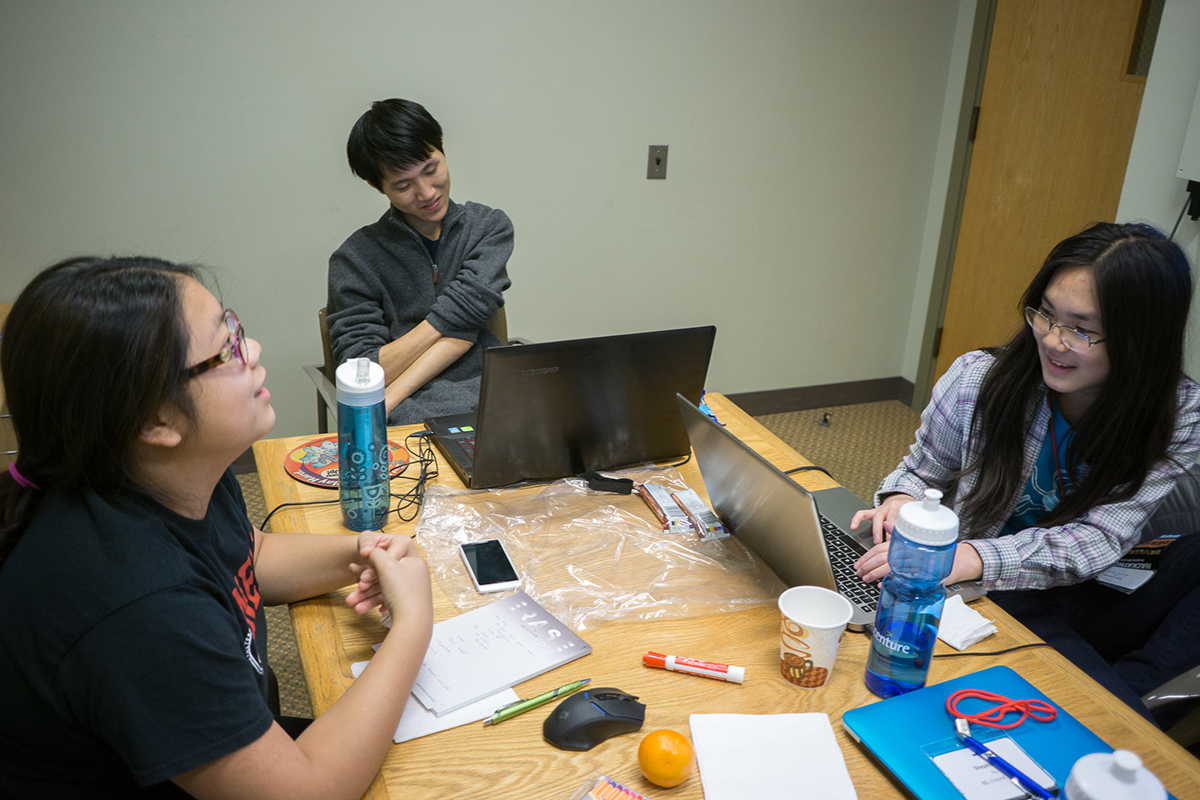125 students commit Random Hacks of Kindness
By Kathy Hovis

More than 125 students spent last weekend in Sage and Olin Halls, brainstorming, coding and meeting with community nonprofits as they sought solutions to problems as part of the Random Hacks of Kindness event Nov. 13.
Sponsored by Entrepreneurship at Cornell and Accenture, the event included 10 nonprofit partners who pitched problems to students, kicking off two days of hacking that ended in final presentations Nov. 15.
“It was really exciting to see the energy that the students brought to this and the amazing work they were able to do in 36 hours,” said Dan Brown, executive director of the Franziska Racker Centers, a Tompkins County organization that supports people with disabilities and their families. To solve the Racker Centers’ problem, students brainstormed a rideshare service that could help ease transportation issues for rural residents.
“We’re going to talk about this idea and be in touch with some groups in town who could help to implement this,” Brown said. “What I like about this event is that it gives students a long-term perspective. It shows them that when they get into their careers, they should do something to give back to society.”
The idea for the hackathon came from Ami Stuart, tech events manager at Cornell, who’s organized many hacks but has always wanted to do one for nonprofit groups.
“This was my first time doing a hackathon for ‘real people,’“ Stuart said. “Students had actual ‘clients’ they were solving for; they weren’t creating new businesses, products or services from scratch for hypothetical customers. This was about as real as it gets – applying academic education to real-world problems.”
Over the summer two student volunteers, Sam Langer ’17, a psychology major in the College of Arts and Sciences and Gabe Polsky ’16, an Agricultural Economics and Management major in the College of Agriculture and Life Sciences, sought out community partners and worked with them to develop a workable problem for the event.
“It’s one of those very rare experiences where you’re tied together for a short time with a group of people you would have never had the chance to meet,” Langer said. “And they end up being connections you’ll have for a very long time.”
Stuart said she was particularly excited that 55 percent of the participants were women.
“I like the goal of this hackathon, to show that you can do this not only for a job but to help people around you,” said Julia Yang ’19, an engineering student. “It was a good opportunity to learn more about myself, more about coding and to be able to work with other students in different majors throughout the university.”
One of the goals of the weekend was to show students the benefits of creating diverse teams, said Wesley Sine, professor of management and organizations at Johnson, who oversaw the event.
“It’s our nature to look for people who are just like us,” Sine told students. “But I hope as you go out to form your teams, you will meet people who are very different from you.” That diversity will cause more debate and conflict, Sine said, but that’s what makes a team’s ideas more well-defined and creative.
Nonprofit leaders said they’ll form plans to follow through on many of the students’ ideas.
The Afya Foundation, which focuses on solutions to the shortage of healthcare supplies globally, is talking about flying a student team to Haiti over winter break to see if they can implement their fix in Haitian clinics, Stuart said. And Polsky, who is president of the Community Partnership Funding Board, a student organization, said his group will work with other teams to fund their projects.
Kathy Hovis is a writer for Entrepreneurship at Cornell.
Media Contact
Get Cornell news delivered right to your inbox.
Subscribe